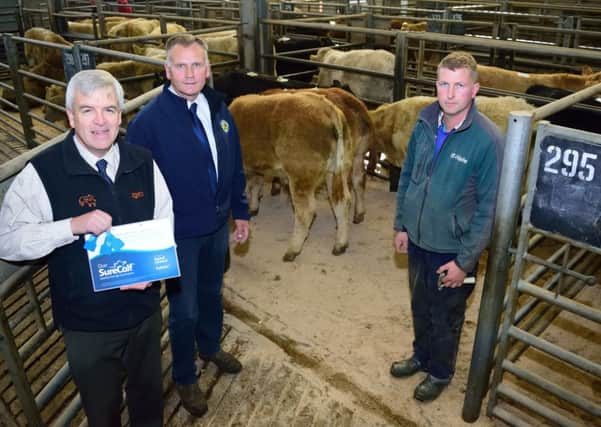Suckled calf prices are beating the trend


Commenting after the first sale in Ballymena Mart, manager Sam McNabney said that both quality and prices were encouraging and he complimented the farmers on the presentation of their stock.
Richard McGinley, who farms at Bendooragh Road, Ballymoney, is a regular exhibitor at Ballymena and admitted to some trepidation regarding demand and prices. However, buyers who purchase his stock every year were keen to do so again. One buyer commented: “Richard has great quality calves and the added bonus is that they are SureCalves® which means they have undergone a vaccination programme and will continue to thrive when they arrive on my farm.”
Advertisement
Advertisement
Richard sold 23 April/May born calves, mostly Charolais with some Limousin, at an average weight of 287 kilos and an average price of 285 pence per kilo. His SureCalves® were identified by their special blue ear tags. He explained: “Good management on farm makes a valuable contribution to calf health status but the combination of the stress of transportation and mixing of calves from different sources at the sales increases exposure to disease. This, in turn, increases the risk of respiratory disease, with the potential for calves to suffer setbacks when they arrive at the finishing farm.
“Not only does this cost money in treatment and calf losses but it can also extend the time needed to finish these calves - costs that the industry cannot afford in today’s economic climate. I vaccinate all of my spring born calves no matter where they are being sold.”
He continued: “There is nothing to beat a satisfied customer – they generate repeat business - it was notable that many of the buyers of my calves at Ballymena are repeat customers. In addition, I sell some calves privately from the farm every year to beef finishers, and to exhibitors seeking commercial calves to finish for the Christmas beef shows and sales.”
Dr. JanVan Dijk, Veterinary Consultant, Zoetis explained: “SureCalf ® Duo is ideal for calves sold in the autumn prior to their first winter housing period. Calves are vaccinated pre-sale against the three key respiratory viruses, BRSv, Pi3v and IBR. Sellers register their calves at least two weeks prior to sale by calling the SureCalf® Helpline on 0800 668 1886. The information required are the dates of birth of the calves, numbers being sold, the date of vaccination and the batch number of the vaccines used, plus the name of their veterinary practice.
Advertisement
Advertisement
“They will then receive personalised SureCalf® certificates and the blue ear tags for exhibiting their animals. The SureCalf® programme is a great example of a more preventative approach towards animal health and is in line with advice given by the Responsible Use of Medicines in Agriculture Alliance (RUMA). Recognising respiratory disease as a key cause of antibiotic use in beef young stock, RUMA advises that reduction in antibiotic use within the beef sector should include strategies to reduce respiratory disease through improved herd management and vaccination.
“The farming industry is also aware of the consumer, retail and political pressure for reduced use of antibioics.” For further information on the SureCalf® programme, visit the website - surecalf.co.uk.